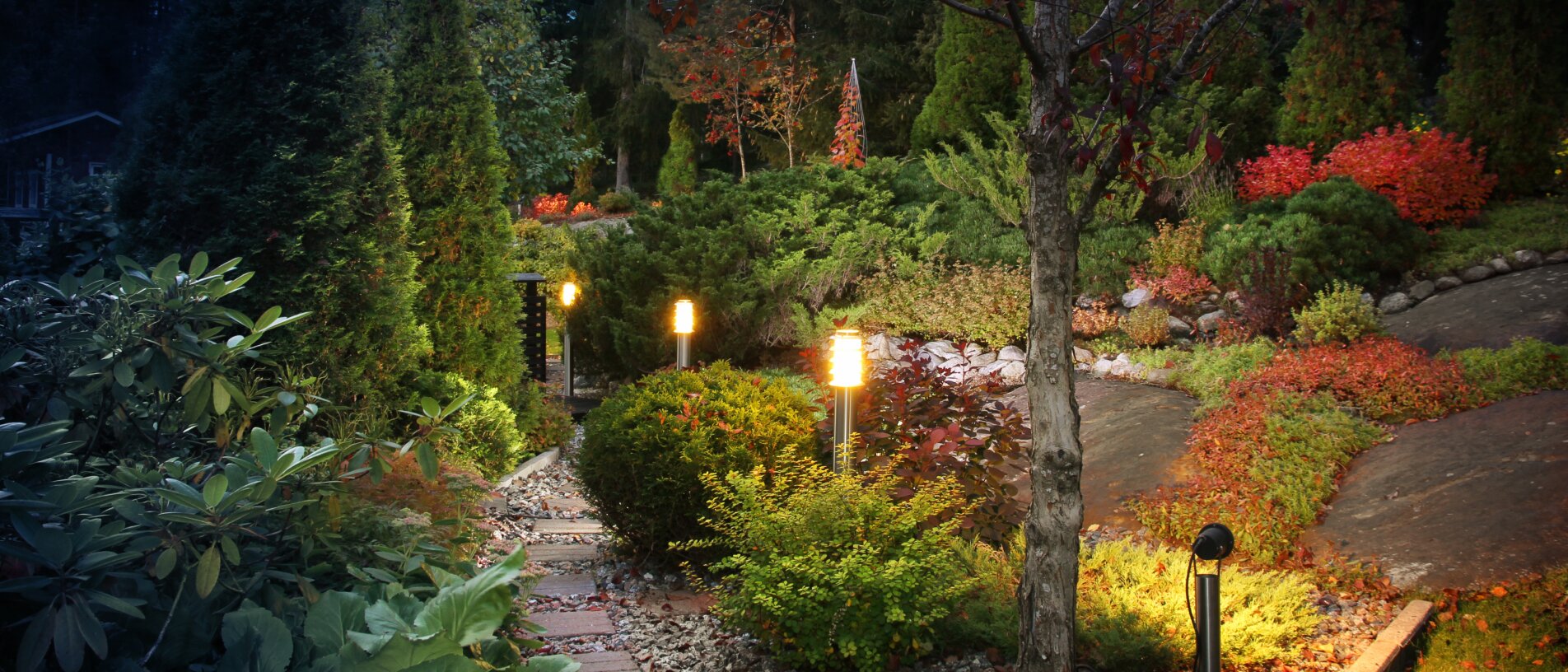You're on the list
By signing up, you agree to receive email marketing.

When the sun goes down, outdoor lighting — or its absence — defines your home’s aesthetic. There are many factors to consider when choosing exterior lighting. This in-depth outdoor lighting buying guide covers popular types of lighting, installation tips, and more.
Why should you invest in outdoor lighting? Here are three benefits of brightening your home’s exterior.
Your outdoor leisure time doesn’t have to end when the sun goes down. Adequate outdoor lighting lets you enjoy your yard for as long as you like. You can lounge on your brightly lit patio with a book and watch the stars come out. Guests can also enjoy your outdoor soirees without feeling like they need to rush home when it gets dark.
Outdoor lighting lets you showcase your home and improve its appearance. Place lights strategically to spotlight your architecture, landscaping, and other stylish features.
A stumble in the dark can spell catastrophe for you, your guests, or delivery people.Install lights in high-traffic areas, including walkways and your front porch.
To improve security, consider adding floodlights or motion-sensor lights around your property.
There are many kinds of outdoor lighting with different features and purposes. Mixing and matching several types of lights will give you the most coverage and functionality.
Pendant lights hang from the ceilings of porches, patios, and other covered spaces. They come in various styles, from rustic lanterns to glamorous outdoor chandeliers. These lights should hang at least six inches above door frames.
Post lights refer to small lights on top of fence posts or lamps mounted on tall poles. People often install these lights next to gates, along driveways, and in other key locations. They’re typically solar-powered and help light the way to your home.
Wall sconces are smaller lights mounted on walls next to doorways and windows. To avoid uncomfortable glare, place them six to seven feet above ground level.
Security lights cast a bright, wide beam of light around your yard. Install them as high as possible for the most illumination, and aim them at areas you want to protect, such as your driveway and back door.
Place ground-level landscape lights around footpaths, gardens, and water features. These small lights highlight your landscaping and create borders between outdoor spaces.
String lights are small bulbs hung from thin wires. They add charm and coziness to any outdoor space. Hang them above your deck, porch, or pergola for a cheery and festive look.
There’s no one-size-fits-all approach to outdoor lighting. These considerations will help you choose the right outdoor lighting for your space.
Start by considering your setup and the intended purpose of your lighting.
For example, you could hang pendant lights above entryways to improve safety and visibility. Additionally, string lights looped around railings or hung overhead make a porch or patio more inviting.
Low landscape lights work best for gardens and pathways. Use these lights to spotlight interesting features and outline the borders of walkways. You could also install landscape lights along your fence so you can see your dogs or kids in the yard at night.
Finally, a stately post lamp beside the driveway will guide cars onto your property. Mount motion-activated flood lights on the corners of your garage to provide additional illumination.
There are two categories of outdoor lights: damp-rated and wet-rated. Install damp-rated fixtures in covered locations shielded from harsh weather. Wet-rated lights are designed for uncovered spots that get wet frequently, such as on top of fences and in flowerbeds.
Outdoor lights use various power sources. Pendant lights, wall sconces, and post lights typically run on electricity. You should have them installed by a licensed electrician for safety.
By contrast, landscape and pathway lights are often solar-powered. Place them in locations that receive adequate sunlight to keep them charged. Finally, some string lights and outdoor lanterns rely on batteries. You’ll need to replace these batteries regularly to keep them functional.
Achieve visual harmony by picking adequately sized outdoor lights that complement their surroundings. The lights should be large enough to emit strong light without overwhelming the space.
For example, a large chandelier light will serve as a showy centerpiece on a spacious porch. By contrast, smaller wall sconces will suit a narrow entryway.
You can also combine different lights of different sizes for a layered look. For instance, you could hang string lights from the top of a pergola and surround the structure with landscape lights for comprehensive illumination.
Follow these best practices to set up your outdoor lighting:
Consider hiring an experienced electrician to install wired lights if you’re unfamiliar with electrical work.
Prioritize entryways and other high-traffic areas.
Place lights around significant features, such as a beautiful tree or pond.
Use a tape measure to space groups of lights evenly apart.
Aim lights down into your yard to prevent them from spilling onto your neighbor’s property.
Save energy with motion-activated lights, timers, and solar-powered lights.
With the right outdoor lighting, you can enjoy your yard 24/7. These fixtures show off the beauty of your home and landscaping to guests and passersby. Outdoor lights also improve accessibility, safety, and security.
Get started by choosing pendant lights, wall sconces, or post lights for your entryway. Look for materials and styles that match your overall aesthetic. You can also quickly install landscape lights to illuminate footpaths and garden borders.
You're on the list
By signing up, you agree to receive email marketing.